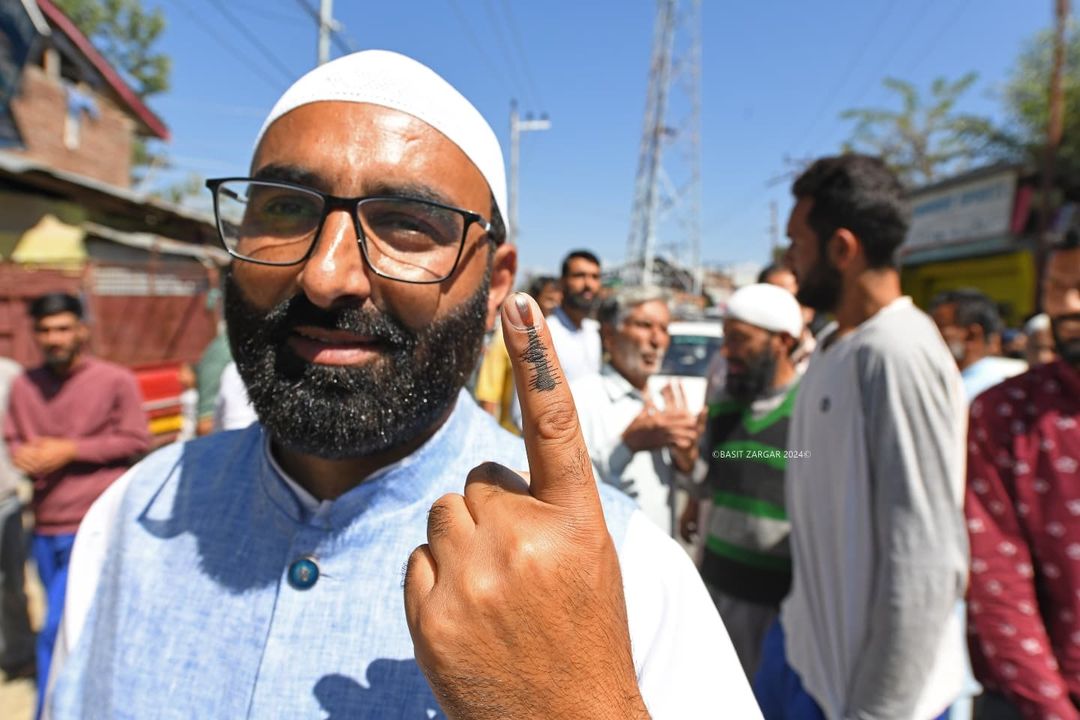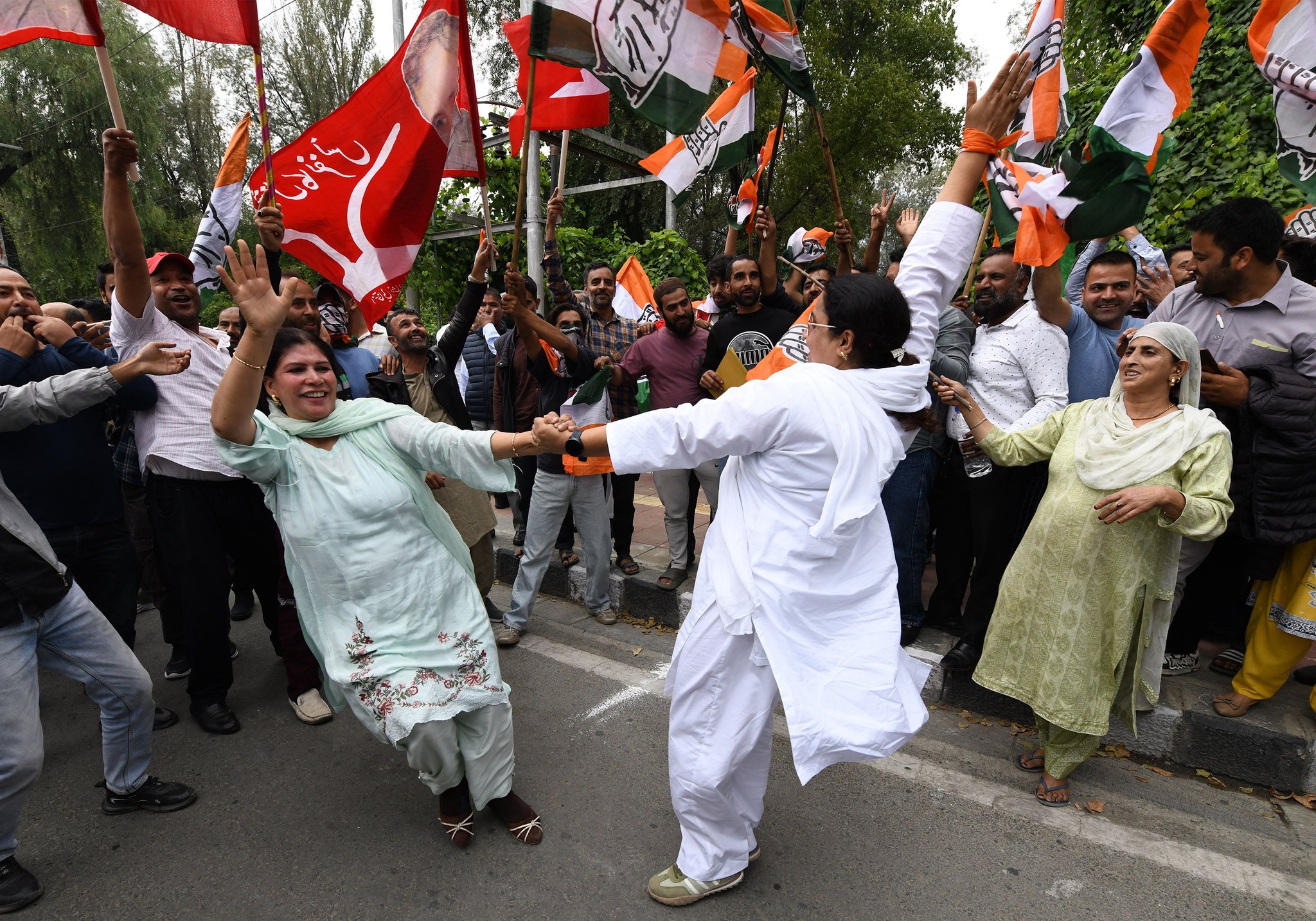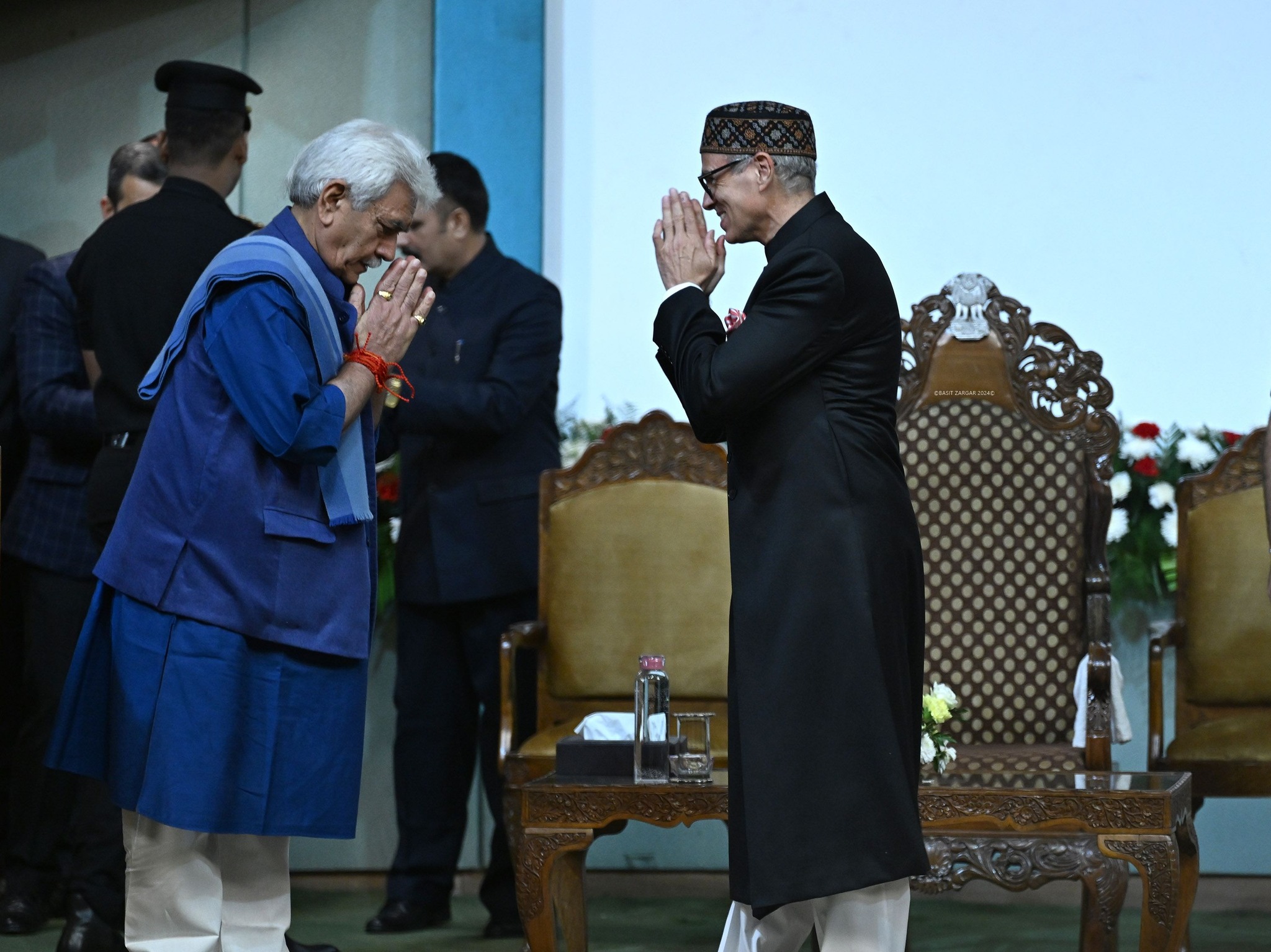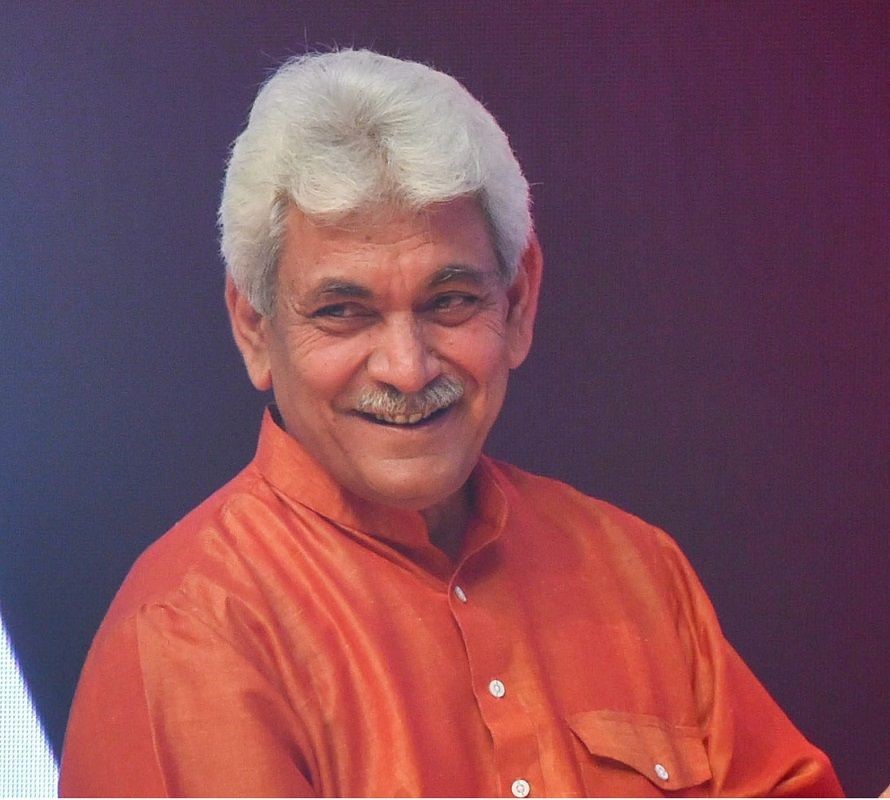Omar Abdullah’s return as Chief Minister after a decade of political flux brings renewed optimism for Jammu and Kashmir’s future, with a focus on rebuilding governance and addressing key regional challenges
By Ajaz Rashid
Jammu and Kashmir, a region long immersed in intricate political narratives, has witnessed a historic shift with the return of democratic governance after a decade-long absence. This transformation was marked by the successful completion of the three-phased Assembly elections, a momentous event signaling a fresh start for the Union Territory, which had been under central rule for years. The elections demonstrated a strong desire for democratic representation among the people of Jammu and Kashmir, reflected in a remarkable voter turnout of 63.9%, surpassing the 58.5% recorded in the recent Lok Sabha elections.
The National Conference-Congress alliance, led by Omar Abdullah, has emerged as the clear victor, securing 42 out of the 90 seats in the legislative assembly. This decisive mandate from the electorate marks a significant moment in the region’s history, renewing hopes for political stability and economic development. Abdullah, who has now assumed the position of Chief Minister, underscored the weight of this mandate in his victory speech. “The people of Jammu and Kashmir have spoken, and we will respect their mandate. We will work relentlessly to address the concerns of our citizens, from unemployment to infrastructure development, and we are committed to ensuring that Jammu and Kashmir regains its rightful status,” he declared. Abdullah’s speech also echoed a widespread demand within the region for the restoration of statehood.
To fully understand the significance of these electoral outcomes, one must consider the key events that have shaped the political landscape of Jammu and Kashmir in recent years. In 2018, the Bharatiya Janata Party (BJP) withdrew from its coalition government with the People’s Democratic Party (PDP), leading to the imposition of Governor’s Rule. This was followed by the Indian government’s 2019 decision to revoke Article 370, the constitutional provision that had granted special status to Jammu and Kashmir. The revocation was accompanied by the bifurcation of the former state into two Union Territories—Jammu and Kashmir, and Ladakh—fundamentally altering the region’s political dynamics.
After a ten-year hiatus, the recent elections provided the people of Jammu and Kashmir with the opportunity to exercise their democratic rights once again. The National Conference-Congress alliance’s electoral victory signals a clear public mandate for change. Voters, it seems, are seeking a return to local governance and progress after years of uncertainty.
The election results offer further insights into the political landscape. Of the 90 seats in the Jammu and Kashmir Assembly, the National Conference secured 42, while the BJP won 29. The Indian National Congress (INC) took 6 seats, and the Jammu and Kashmir People’s Democratic Party (JKPDP) secured 3. Other parties, including the Jammu and Kashmir People’s Conference, Communist Party of India (Marxist) (CPI(M)), and Aam Aadmi Party (AAP), won 1 seat each. Meanwhile, 7 seats were claimed by independent candidates, reflecting the diverse political engagement across the region.
This resounding return to democracy, bolstered by a high voter turnout and a decisive mandate for the National Conference-Congress alliance, marks a new beginning for Jammu and Kashmir. As Omar Abdullah takes the reins of leadership, all eyes are on how his government will address the pressing issues facing the region, including unemployment, economic development, and the demand for the restoration of statehood. The political and social trajectory of Jammu and Kashmir is now poised for a pivotal transformation, with hopes pinned on a future of renewed stability and progress.
Omar Abdullah’s oath as Jammu-Kashmir CM
Omar Abdullah, leader of the Jammu and Kashmir National Conference, made history on Wednesday by being sworn in as the first Chief Minister of the newly created Union Territory of Jammu and Kashmir. The oath-taking ceremony was held at the Sher-i-Kashmir International Conference Centre (SKICC) in Srinagar, marking a significant political moment for the region.
The event was attended by prominent leaders from the opposition INDIA bloc, highlighting its importance on the national political stage. Among those present were senior Congress figures Rahul Gandhi and Priyanka Gandhi Vadra, Samajwadi Party president Akhilesh Yadav, People’s Democratic Party (PDP) chief Mehbooba Mufti, Aam Aadmi Party (AAP) leader Sanjay Singh, and Communist Party of India (CPI) leader D. Raja, among others.
Despite the close alliance between the Congress party and Abdullah’s National Conference during the recent Assembly elections, the Congress has notably chosen to remain out of the newly-formed government. This decision adds a layer of intrigue to the political dynamics in the region, as the party continues to weigh its future role in Jammu and Kashmir’s governance.
First Cabinet Meet and demand to restore Statehood
Jammu and Kashmir Lieutenant Governor Manoj Sinha has approved a resolution passed by the Cabinet led by Chief Minister Omar Abdullah, urging the central government to restore full statehood to the Union Territory, officials confirmed on Saturday, October 19, 2024.
The Cabinet convened on Thursday, October 17, 2024, under the chairmanship of Omar Abdullah, who is the Chief Minister of Jammu and Kashmir. During the meeting, the Cabinet unanimously passed a resolution calling for the restoration of statehood to Jammu and Kashmir in its original form. According to a government spokesperson, this move is seen as a significant step toward restoring the region’s constitutional rights and identity. The official statement emphasized that the restoration of statehood would mark the beginning of a healing process for the people of Jammu and Kashmir, reclaiming their constitutional rights and preserving their unique identity.
The Cabinet has also authorized Chief Minister Omar Abdullah to take up this matter with the Prime Minister and the Government of India to ensure that the restoration of statehood is prioritized. The National Conference’s (NC) push for the restoration is reportedly supported by a recent Supreme Court judgment, which has added legal weight to the demand.
Protecting the unique identity of Jammu and Kashmir and safeguarding the constitutional rights of its people have been the primary objectives of the newly elected government, the spokesperson noted. In the coming days, the Chief Minister is expected to travel to New Delhi to meet with the Prime Minister and other key Union Ministers to discuss the issue further.
Additionally, the Cabinet has decided to convene the Jammu and Kashmir Legislative Assembly in Srinagar on November 4, 2024. They have advised the Lieutenant Governor to summon and address the Assembly during this session. A draft of the Lieutenant Governor’s address to the Assembly at the commencement of the first session was presented before the Council of Ministers, who agreed that it would require further deliberation before approval.
LG’s Controversial Power to Nominate Assembly Members
The Controversy Surrounding the Lieutenant Governor’s Power to Nominate Assembly Members has become a focal point in the post-election political landscape of Jammu and Kashmir. At the center of this debate is the authority granted to the lieutenant governor (LG) under the Jammu and Kashmir Reorganisation Act of 2019, which was further amended in 2023. The law empowers the LG to nominate five members to the legislative assembly, a provision that has sparked considerable political and legal debate. This controversy, which has intensified following the recent assembly elections, is particularly centered around the voting rights of these nominated members during crucial legislative moments, such as government formation or votes of no confidence.
According to The Economic Times, the 2019 Act, amended in 2023, allows the LG to nominate two women, two individuals from the migrant community, and one member representing refugees from Pakistan-Occupied Jammu and Kashmir (POJK). However, the legislation remains ambiguous about whether these nominated members have the right to vote during critical moments, such as the formation of the government or a vote of no confidence, creating a potential legal grey area that could influence the balance of power.
BJP leader Sunil Sethi has staunchly defended this provision, arguing that it mirrors similar laws in other Union Territories, like Puducherry, where nominated members are allowed to vote, a decision that has been upheld by the Supreme Court. “If political parties have an issue with this, they should not have participated in the elections,” Sethi stated, emphasizing that Jammu and Kashmir, as a Union Territory, is no longer bound by the governance rules of a state. He reiterated that nominated members should be allowed to vote, suggesting that those opposing this provision are ignoring the unique political status of the region.
On the other hand, Congress leader Ravindra Sharma has criticized this move, accusing the BJP of attempting to manipulate the electoral process. He claimed that the party is trying to “turn a majority into a minority through nominated MLAs,” implying that the BJP could use this provision to alter the democratic outcome. Senior legal experts have also weighed in on the matter, with Zafar Shah, a senior advocate, describing the situation as “dicey” due to the distinct political history and constitutional status of Jammu and Kashmir. Shah argued that “the law cannot be applied in a mathematical form” in Jammu and Kashmir, indicating that this issue could spark political friction and legal challenges.
Adding another layer to the controversy is the fact that the assembly has not yet been fully constituted, raising further questions about the timing and legitimacy of nominating members at this stage. Legal and political analysts are closely watching how this issue unfolds, as it could set a significant precedent for the functioning of the assembly.
Amidst these controversies, the high voter turnout in the recent elections—63.9%, higher than the Lok Sabha elections—has been seen as a clear indication of the public’s strong desire for a return to democratic governance and political engagement. This participation reflects the people’s yearning for stability after years of political upheaval.
Jammu and Kashmir’s political history is marked by strife, particularly over its special status under Article 370, which was designed to protect its unique demographic composition and provide a degree of autonomy. The revocation of Article 370 in 2019, along with the bifurcation of the state into two Union Territories—Jammu and Kashmir, and Ladakh—sparked widespread discontent and uncertainty, leaving the region in a state of political and social flux. The BJP’s withdrawal from its coalition government with the PDP in 2018 further complicated the political landscape, as it led to direct central rule, raising concerns about the erosion of local governance and the disenfranchisement of the population.
These events set the stage for the recent elections, which were more than a procedural formality; they represented a critical moment for the people of Jammu and Kashmir to reassert their democratic rights after years of political stagnation.
In his post-election speech, Omar Abdullah, leader of the National Conference and newly appointed Chief Minister, emphasized the importance of this victory for the future of Jammu and Kashmir. “This victory is a testament to the people’s faith in democracy,” Abdullah asserted, pledging to prioritize development and the restoration of statehood, a demand echoed by many voters. He also committed to addressing critical issues such as unemployment and infrastructure development, which have been longstanding concerns in the region.
Union Home Minister Amit Shah also acknowledged the significance of this political shift. He reaffirmed the central government’s commitment to the region’s development, stating, “We will support the new government in its development initiatives, ensuring that the region progresses. The BJP remains committed to the welfare of the people of Jammu and Kashmir.”
Former Chief Minister and PDP President Mehbooba Mufti offered a reflective perspective on the elections, calling it “a new beginning for Jammu and Kashmir.” She vowed to continue fighting for the rights of the people and to ensure that their voices are heard, underscoring the ongoing struggles for representation and autonomy.
Ghulam Nabi Azad, Patron of the Democratic Progressive Azad Party (DPAP), also highlighted the importance of democracy in the region, stating, “Democracy is crucial for our region’s stability. We will work tirelessly to strengthen it and ensure that development reaches every corner of Jammu and Kashmir.”
Local residents have expressed a mixture of hope and expectations for the newly elected government. Sajad Ahmad, a local resident, shared his aspirations: “We expect the government to create jobs, improve infrastructure, and ensure our children receive quality education. We also hope they address the issue of statehood and ensure our rights are protected.”
The National Conference, one of the oldest political parties in Jammu and Kashmir, has made statehood and the restoration of Article 370 a central focus of its election manifesto. Omar Abdullah has reiterated his party’s commitment to achieving full autonomy for the region and restoring its pre-2019 status, including the revision of the J&K Reorganisation Act of 2019.
As the newly formed government embarks on this next chapter, the challenges ahead are immense, from unemployment and infrastructure development to navigating the region’s complex political landscape. However, the high voter turnout and the decisive mandate for change signal that the people of Jammu and Kashmir are ready for a new era of governance and progress.
Farooq Abdullah on Prioritizing People’s Needs
In a significant shift from his previous stance, National Conference (NC) president Dr. Farooq Abdullah has reoriented his political message, emphasizing that addressing the immediate, everyday challenges of the people should take precedence over the swift restoration of Article 370. “Solving people’s problems is more important than Article 370,” Abdullah remarked during a public interaction in Srinagar on Thursday, signaling a pragmatic turn in his approach. This statement is notable, as it marks a clear departure from his earlier rhetoric during election campaigns, where he consistently called for the reinstatement of Article 370, the provision that granted special autonomy to Jammu and Kashmir.
Abdullah, a three-time Chief Minister of Jammu and Kashmir, also addressed rumors about his potential nomination to the Rajya Sabha, humorously quipping, “Who said I am going? The day I go, I’ll salute you first.” His comments have stirred considerable interest, particularly given his long-standing political influence in the region.
While there is optimism surrounding the newly formed government, several challenges lie ahead that could impede progress. One of the most pressing issues is the region’s security. Jammu and Kashmir continues to grapple with militancy and border tensions, which pose significant threats to peace and stability. Ensuring the safety of residents will be crucial, as any resurgence of violence would destabilize the region and undermine the government’s efforts to foster peace.
Just days after assuming office as Chief Minister, Omar Abdullah has already been confronted with the harsh realities of governing in a volatile region. In a tragic reminder of the persistent security challenges, a terrorist attack occurred in Shopian, resulting in the death of a migrant laborer, Ashok Chauhan, whose body was discovered in the Wachi area of Zainapora. This incident, happening so soon after the new government was formed, underscores the urgent need for Abdullah’s administration to address security concerns effectively. Expressing his sorrow over the killing, Abdullah strongly condemned the attack, taking to social media to say, “These attacks are abhorrent & must be condemned in the strongest possible terms,” while offering condolences to the victim’s family.
Beyond security, another critical challenge is the economic revival of the region. Jammu and Kashmir’s economy has long been unstable, with industries languishing and investment opportunities scarce. The government must work to create a business-friendly environment to attract investments and spur industrial growth. Revitalizing key sectors, such as tourism and agriculture, and developing infrastructure will be essential for fostering sustainable economic development.
Additionally, the process of reconciliation will be vital in healing the deep-seated divisions within the Union Territory. Gaining the trust of various communities, addressing historical grievances, and fostering unity will be necessary to create an atmosphere of inclusion and cooperation. The new government faces the delicate task of reconciling the divergent political views within the region, navigating the polarized landscape while ensuring that all voices are heard.
Ensuring sustainable peace and stability in Jammu and Kashmir will require a pragmatic balance of reconciliation, regional unification, and inclusive governance. The political landscape in the region is deeply fragmented, and the government will need to navigate these divisions carefully to achieve its goals. Delivering on promises, addressing public expectations, and managing the aspirations of the people will be crucial as the administration moves forward. With hopes running high for significant change, the government must align its strategic planning with effective execution to bring meaningful results.
As the new government begins its tenure, the people of Jammu and Kashmir are watching closely, eager for improvements in their daily lives. Ariz Rather, a student from Srinagar, expressed her hope for better educational facilities. “We want our schools to be equipped with better resources, and we hope that the government will prioritize education,” she said, highlighting a common concern among the youth.
Similarly, Farooq Ahmad, a local businessman, stressed the importance of economic development. “Revitalizing our economy is crucial. We need support for local businesses and infrastructure development to attract tourists,” he noted, pointing to the critical need for economic reforms that benefit local industries.
The collective hopes and expectations of the people reflect a desire for tangible improvements and a belief in the power of democracy to bring about positive change. The National Conference-Congress alliance’s victory is seen by many as an opportunity for renewed cooperation between regional and national parties, potentially leading to more effective governance.
Dr. Farooq Abdullah has also signaled his openness to collaborating with the central government. “We will work with the central government to ensure Jammu and Kashmir’s development. We will also engage with other political parties to build a consensus on key issues,” he assured, suggesting that a cooperative approach could pave the way for more efficient policy implementation.
This cooperative spirit, if maintained, could lead to more effective governance and policy execution in Jammu and Kashmir. However, for this to succeed, it is essential that all political stakeholders prioritize the needs and aspirations of the people over political rivalries. Only through unity and focused governance can the new administration hope to bring about the significant changes that the people of Jammu and Kashmir are yearning for.
J&K Elections and Regional Polarization
The recently concluded elections in Jammu and Kashmir (J&K) have delivered a decisive mandate for the opposition alliance, particularly the National Conference (NC) and the Congress, both key constituents of the larger INDIA bloc. These results mark a significant victory for mainstream political forces in the region, underscoring a preference for established parties over those with separatist sympathies. This election holds particular importance, being the first provincial vote in a decade following the Modi government’s 2019 revocation of J&K’s special autonomy and its bifurcation into two Union Territories under central control.
Despite earlier exit polls predicting a fragmented assembly with no clear majority, the INDIA bloc defied expectations by securing 48 out of the 90 available seats. This is a solid majority, surpassing the 46-seat threshold required to form a government. Commenting on the outcome, Muhammad Yusuf Tarigami, a senior leader of the Communist Party of India (Marxist) and a member of the INDIA bloc, remarked, “The mandate is clear. People voted against the central government and its policies.” His words reflect the broad-based opposition to the Bharatiya Janata Party’s (BJP) policies in the region.
The election results reveal deeply polarized voting patterns between the Kashmir Valley and the Jammu region. In Jammu, the BJP managed to secure 29 out of 43 assembly constituencies, reinforcing its strong support base among the predominantly Hindu population. However, in the Muslim-majority Kashmir Valley, the NC and Congress solidified their grip, sweeping the majority of seats. This clear divide illustrates a growing polarization in the political landscape of J&K, with voters in Kashmir showing a distinct preference for mainstream regional parties over those aligned with separatist ideologies or the BJP’s centralist platform.
The election also cast a spotlight on the failures of smaller regional parties, particularly the Awami Ittehad Party (AIP) and the Jamaat-e-Islami (JeI), both of which struggled to make any significant impact. One of the most notable defeats was that of Engineer Rashid, the controversial leader of the AIP, who failed to secure any seats aside from one held by his brother. Rashid, who had been embroiled in terror-funding allegations, had previously gained popularity through his populist rhetoric, but this appeal failed to translate into electoral success. His party’s poor performance underscores the electorate’s rejection of divisive politics.

Similarly, the JeI, which has historically represented separatist sentiment, entered the election under the banner of independent candidates for the first time since its 2019 ban. However, out of the ten candidates it fielded, only one managed to secure a seat. This limited success highlights the declining appeal of separatist politics in modern Kashmir. A Srinagar-based journalist noted, “This is a triumph of mainstream Kashmiri politics over separatism, even if a temporary one.” The dwindling influence of separatist-aligned candidates suggests a growing disillusionment with such ideologies among the electorate.
The results of this election can also be seen as a clear rejection of the BJP’s narrative and its policies in J&K. Former Chief Minister Mehbooba Mufti’s party, the People’s Democratic Party (PDP), which had previously allied with the BJP in 2014, struggled to recover from the setbacks it suffered in recent parliamentary elections. Many political observers attribute the PDP’s decline to its controversial alliance with the BJP, which alienated much of its traditional voter base. While the BJP retained significant power in Jammu, it failed to make inroads in the Kashmir Valley, reflecting the region’s complex electoral dynamics.
In a dramatic response to the election results, Engineer Rashid called for a boycott of government formation until the federal government restored full statehood to J&K. Had parties like the AIP and JeI won more seats, such a demand could have sparked a constitutional crisis. However, the decisive victory of the NC and Congress ensures that the path is clear for Omar Abdullah’s return as Chief Minister. This outcome represents a strong mandate for mainstream governance, with the electorate signaling its preference for stability over separatist or fringe political movements.
The election results also underscore the growing polarization in J&K politics, with stark regional and religious divides shaping voter preferences. In Jammu, the BJP continues to enjoy strong support, while in Kashmir, mainstream regional parties like the NC and Congress dominate. This polarization presents ongoing challenges for the BJP as it seeks to navigate the region’s complex political landscape. The party’s efforts to consolidate its influence in J&K have been hindered by the realities on the ground, which often conflict with its broader national agenda.
As the newly elected government prepares to take office, the people of Jammu and Kashmir are watching closely, hopeful that their voices will be heard and their needs addressed. The victory of the NC-Congress alliance, coupled with the electorate’s rejection of separatist ideologies, suggests a desire for mainstream political representation and a return to stability after years of turmoil. However, the regional polarization highlighted by the election results will continue to shape the future of politics in J&K, posing significant challenges for the new government as it seeks to bridge divides and govern effectively.



Leave a Reply